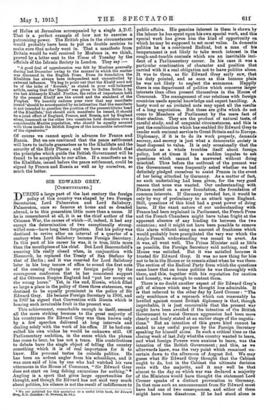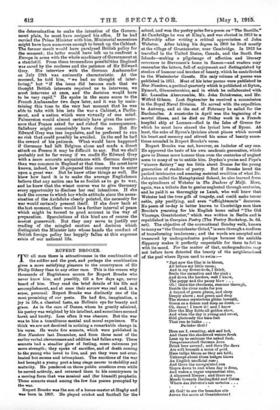SIR EDWARD GREY.
[COMMUNICATED.]
DURING a large part of the last century the foreign policy of this country was shaped by two Foreign Secretaries, Lord Palmerston and Lord Salisbury. Palmerston, once so famous at home and so dreaded abroad, is to this generation little more than a name. If he is remembered at all, it is as the chief author of the Crimean War, the causes of which—if, indeed, it had any except the determination of two exceptionally strong- willed men—have long been forgotten. But his policy was destined to revive after an interval of a quarter of a century when Lord Salisbury became Foreign Secretary. In this part of his career he was, it is true, little more than the mouthpiece of his chief. But Lord Beaconsfield's amazing life really closed when, in conjunction with Bismarck, he replaced the Treaty of San Stefano by that of Berlin ; and it was reserved for Lord Salisbury later in his long tenure of office to sound the first note of the coming change in our foreign policy by the courageous confession that in her consistent support of the Ottoman Empire England had "put her money on the wrong horse." Yet, in the end, Russia, which filled so large a place in the policy of these three statesmen, was destined to be equally prominent in the policy of Sir Edward Grey. He became Foreign Secretary in 1906, and in 1907 be signed that Convention with Russia which is bearing such invaluable fruit in the present war.
This achievement, remarkable enough in itself, seemed all the more striking because to the great majority of his countrymen Sir Edward Grey was then known only by a few speeches delivered at long intervals and dealing solely with the work of his office. If be had con- sulted his own wishes he would be unknown still. Of Parliamentary ambition, in the sense which the phrase has come to bear, he has not a trace. His contributions to debate have the single object of telling the country something which it is of real importance for it to know. His personal tastes lie outside politics. He has been an ardent angler from his echooldays, and it was once said of him by one who bad watched his rare utterances in the House of Commons, "Sir Edward Grey does not start on long fishing excursions for nothing."• Angling is a sport that gives large opportunities for thought, and though Sir Edward has not said very much about politica, his silence is not the result of indifference to
• We are indebted for thin quotation to a woeful Mile book, Sir Edward Grey, E.G. (Loudon, 0, Hamm, Ss. Od.b
public affairs. His genuine interest in them is shown by the labour he has spent upon his own special work, and this special work has given him the kind of opportunity on which he may be supposed to set most value. In domestic politics he is a convinced Radical, but a man of his temperament is not likely to take much interest in the rough-and-tumble contests which are an inevitable inci- dent of a Parliamentary career. In his case it was a particular combination of character and position that carried with it a real obligation not to leave politics alone. It was to them, as Sir Edward Grey early saw, that his duty pointed, and as soon as this became plain he was not likely to neglect the summons. Happily there is one department of politics which concerns larger interests than often present themselves in the House of Commonii. The management of our relations with foreign countries needs special knowledge and expert handling. A. hasty word or an irritated note may upset all the results of a long negotiation. But these are gifts which do not come to Members of Parliament by the mere fact of their election. They are the product of natural taste, of careful study, and of congenial circumstances, and this is just the combination which has enabled Sir Edward Grey to render such eminent service to Great Britain and to Europe. Diplomacy, if it is to do its work properly, demands secrecy, and secrecy is just what a democratic society is least disposed to value. It is only occasionally that the electorate as a whole troubles itself about foreign policy, but at times it has a sudden impulse to ask questions which cannot be answered without doing mischief. Thus before the outbreak of the present war the Government were frequently asked whether we had definitely pledged ourselves to assist France in the event of her being attacked by Germany. As a matter of fact, no such undertaking had been given, for the very good reason that none was wanted. Our understanding with France rested on a surer foundation, the foundation of common interests. If Germany invaded her, it would be only by way of preliminary to an attack upon England. Still, questions of this kind had a great power of doing harm. If the exact nature of our understanding with France had been explained in Parliament, the French Press and the French Chambers might have taken fright at the apparent absence of any binding tie between the two countries ; and it might not have been possible to remove this alarm without using an amount of frankness which would probably have precipitated the very war which the Anglo-French understanding was meant to avert. Al it was, all went well. The Prime Minister said as little as possible, the Foreign Secretary said nothing, and the House was satisfied. But it was satisfied because it trusted Sir Edward Grey. It was no new thing for him not to be in the House or to remain silent when he was there. The section of the Radical Party from which the questions came knew that on borne politics he was thoroughly with them, and this, together with hie reputation for caution and honesty, was enough to content them.
There is no doubt another aspect of Sir Edward Grey's gift of silence which may be thought less admirable. It ie that referred to the other day by Lord Cromer : "The only semblance of a reproach which can reasonably be levelled against recent British diplomacy is that, though improbable, it is just conceivable that the present war might have been avoided if the intention of the Brian!' Government to resist German aggression had been more clearly and firmly stated at an earlier stage of the negotia- tions." But an intention of this grave kind cannot be stated to any useful purpose by the Foreign Secretary speaking for himself alone. In such a critical time as the closing week of last July what the country wanted to learn, and what foreign Powers were anxious to learn, was tha intention of the British Government ; and this, as we afterwards knew, was the very point which remained un- certain down to the afternoon of August 3rd. We may guess what Sir Edward Grey thought that the Cabinet ought to do, but in the Cabinet the ultimate decision rest. with the majority, and it may well be that almost to the day on which war was declared a majority of the Ministers would have thought the statement Lord Cromer speaks of a distinct provocation to Germany. In that case such an announcement from Sir Edward must have had one of two consequences, and either of them might have been disastrous. If he bad stood alone in the determination to make the intention of the Govern- ment plain, he must have resigned his office. If he had carried the Prime Minister with him, Ministerial secessions might have been numerous enough to break up the Cabinet. The former result would have paralysed British policy for f be moment ; the latter would have left us to confront a Europe in arms with the whole machinery of Government at a standstill. From these tremendous possibilities England was saved by the coolness and the pa 'hence of Sir Edward Grey. His interview with the German Ambassador VII July 29th was eminently characteristic. At the moment, be told him, " we had no thought of inter- fering,' but "if the issue did become such that we thought British interests required us to intervene, we must intervene at once, and the decision would have to be very rapid." He spoke in the same sense to the French Ambassador two daps later, and it was by main- taining this tone to the very last moment that he was able to take with him into the war a Cabinet, a Parlia- ment, and a nation which were virtually of one mind. Palmerston would almost certainly have given the assur- ance that France asked for and risked the consequences. Salisbury might conceivably have done so. But Sir Edward Grey was less impulsive, and he preferred to run no risk that could possibly be avoided. In the end be bad the reward of his patience. What would have happened if Germany had left Belgium alone and made a direct attack on France it may be difficult to say. But we shall probably not be far wrong if we credit Sir Edward Grey with a more accurate acquaintance with German designs than was common in England at that time. He meat have known, indeed, how ill-prepared this country was to enter upon a great war. But he knew other things as well. He knew how hard it is to make the average Englishman believe that any nation can be so foolish as to go to war, and he knew that the wisest course was to give Germany every opportunity to disclose her real intentions. If she took the course to which her whole attitude since the assas- sination of the Archduke clearly pointed, the necessity for war would certainly present itself. If she drew back at the last moment, there would be a further interval of peace which might be turned to good account in the way of preparation. Speculations of this kind are of course the merest guesswork. But they may nerve to justify our reading of the mingled caution and decision which distinguish the Minister into whose hands the conduct of British foreign policy has happily fallen at this supreme crisis of our national life.



































 Previous page
Previous page